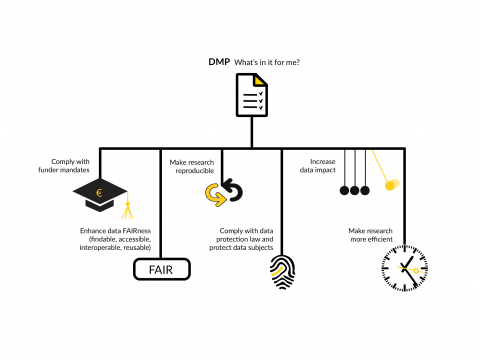Data management planning
What is a Data Management Plan?
A Data Management Plan (DMP) is a formal document you develop at the start of your research project which outlines all aspects of managing your data, both during and after your project. It contains, among others:
- what data you will collect (type, size)
- where you will store them, who will have access to them and how access is regulated
- how often you will back-up your data
- how you will document your data
- the versioning strategy and folder structure you will use
- whether there are any privacy and ownership issues
- whether and how you are planning to archive and share your data.
Why do you need a DMP?
Data management is all about making your work efficient and creating more value for your data for yourself and others, during and after your research, for instance by working towards FAIR (findable, accessible, interoperable, reusable) data. Thinking about data management at the start of your project will ensure that you are well prepared. Read this RDM Story with Tessa Sinnige who now values the importance of data management and a DMP.
The following advantages are within your reach with good data management planning:

How to write a data management paragraph
When writing a research grant proposal, funders, such as NWO, will often ask for a data management paragraph. This paragraph is often a series of questions where you must briefly explain:
The type of data you will generate and whether it is suitable for re-use
When applicable, it is sufficient to state that all data is suitable for re-use. However, if some data is not suitable, you must explain the reasons (i.e., privacy, intellectual property, etc.) and elaborate on whether this applies to all data or just parts of it (e.g., only raw data or only interview data is not suitable for reuse).
How the data will be stored during the research
In most cases it is enough to state that the data will be stored in secure and backed-up institutional storage solutions. Further elaboration is helpful when using another storage solutions which is not supplied or managed by Utrecht University.
How the data will be preserved after the research
Describe here how long the data will be preserved for (10 years is the Utrecht University policy for any raw data underlying a published research article) and where it will be stored. This may be the repository where you plan to share the data or it may be the institutional storage that was already used during the research (e.g., Yoda).
How the data will be shared
This question refers to the question on re-use. If you answered that some or all data is fit for re-use, you should specify where you would plan to make the data available. Funders often expect you to name a repository (e.g., Yoda, DataverseNL, Zenodo, MagIC, etc.) and specify whether the repository grants you a persistent identifier (e.g., a DOI).
Whether any special facilities (not already provided or available at your institution) or services will be needed to store, archive or process your data
Here you may mention repository costs or other data management-related costs which you believe are not readily available at your institution or for which you think you may need extra funding. It is currently unclear whether funders take this input into consideration when selecting the grant amount.
Changes in your data
Answering these questions meets the demands of most funders concerning the data management paragraph. It is important to note that the answers given at this stage are not binding. If the data you can share changes due to valid reasons, this can always be adapted later in the project. Similarly, the data management paragraph does not bind you to a specific storage solution or repository. This paragraph is meant to engage the researcher on the topic of data management and help them think ahead.
How to write a DMP
When writing your own DMP, you can:
Use DMPonline to write your DMP
At Utrecht University, we use the online tool DMPonline, where you can fill in and collaborate on your data management plan. DMPonline contains templates from many different funders (e.g., NWO, ZonMw and ERC) as well as the institutional templates from participating universities. The template offered by Utrecht University is tailored to the requirements which are laid down in the University Policy Framework for Research Data And approved by both NWO and ZonMw. This also applies to the DMP template of the UMCU.
Get advice or feedback
If you are in need of advice or want your DMP reviewed, you can contact Research Data Management Support anytime, or click “Request feedback” in DMPonline. For support at UMC Utrecht, you can contact your division data manager. NWO also offers an assessment rubric for DMPs.
Need more information or an introduction?
Follow the online training 'Learn to write your DMP' or join our workshop Quick start to Research Data Management and ask all your questions.

